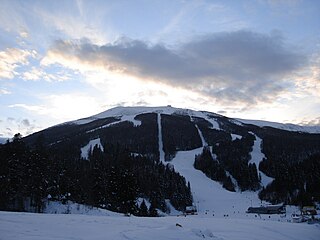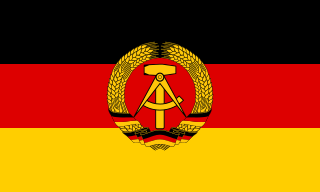
The modern Olympic Games or Olympics are leading international sporting events featuring summer and winter sports competitions in which thousands of athletes from around the world participate in a variety of competitions. The Olympic Games are considered the world's foremost sports competition with more than 200 nations participating. The Olympic Games are held every four years, alternating between the Summer and Winter Games every two years in the four-year period.

The 1984 Summer Olympics, officially known as the Games of the XXIII Olympiad, was an international multi-sport event that was held from July 28 to August 12, 1984, in Los Angeles, California, United States. This was the second time that Los Angeles had hosted the Games, the first being in 1932. The United States won the medal count, winning the both the most gold medals and the most overall medals.

The 1984 Winter Olympics, officially known as the XIV Olympic Winter Games, was a winter multi-sport event which took place from 8–19 February 1984 in Sarajevo, Yugoslavia, in what is now Bosnia and Herzegovina. Other candidate cities were Sapporo, Japan; and Gothenburg, Sweden.

The 1988 Winter Olympics, officially known as the XV Olympic Winter Games, was a multi-sport event celebrated in and around Calgary, Alberta, Canada, between February 13 and 28, 1988 and were the first Winter Olympics to be held over a whole two week period. The host city was selected in 1981 over Falun, Sweden, and Cortina d'Ampezzo, Italy. Most events took place in Calgary while several skiing events were held in the mountain resorts of Nakiska and Canmore, west of the city.

The 1984 Winter Paralympic Games were the third Winter Paralympics. They were held from 14 to 20 January 1984 in Innsbruck, Austria. They were the first Winter Games organized by the International Co-ordinating Committee (ICC), which was formed on 15 March 1982, in Leysin, Switzerland. These Games were accessible for all athletes with cerebral palsy. For the first time, an exhibition event was held at the Olympic Winter Games in Sarajevo and 30 male three-track skiers took part in the Giant Slalom event. Three sports were contested: alpine skiing, cross-country skiing, and ice sledge speed racing. The most successful athlete was German alpine skier Reinhild Moeller, who won 3 gold medals and 1 silver medal. The Games, then known as the Third World Winter Games for the Disabled, were fully sanctioned by the International Olympic Committee (IOC).
The 1988 Winter Olympics, officially known as the XV Olympic Winter Games, was a winter multi-sport event held in Calgary, Canada, from 13 to 28 February 1988. A total of 1,423 athletes representing 57 National Olympic Committees (NOCs) participated in 46 events from 10 different sports and disciplines. Five new events were contested at these Games—men's and women's Super G in alpine skiing, team events in Nordic combined and ski jumping, and women's 5000 metres in speed skating—and two events returned to the program—men's and women's combined in alpine skiing.
The 1984 Winter Olympics, officially known as the XIV Olympic Winter Games, was a winter multi-sport event held in Sarajevo, Yugoslavia, from 8 to 19 February 1984. A total of 1,272 athletes representing 49 National Olympic Committees (NOCs) participated in 39 events from 10 different sports and disciplines. First time NOCs to enter were Egypt, Monaco, Puerto Rico, Senegal, and British Virgin Islands.

Jayne Torvill, OBE is an English ice dancer. With Christopher Dean, she won a gold medal at the 1984 Winter Olympics and a bronze medal at the 1994 Winter Olympics, becoming one of the oldest figure skating Olympic medalists.

Alpine Skiing at the 1984 Winter Olympics consisted of six alpine skiing events, held 13–19 February in Sarajevo, Yugoslavia. The men's races were at Bjelašnica and the women's at Jahorina. Due to weather delays, both downhill races were postponed several days and run after the giant slalom races.

Australia competed at the 1984 Winter Olympics in Sarajevo, Yugoslavia. Eleven athletes participated, competing in alpine skiing, biathlon, cross-country skiing, figure skating and speed skating. Australia's best result was 19th in downhill skiing by Steven Lee.

Several tropical nations have participated in the Winter Olympics despite not having the climate for winter sports. Partly because of that, their entries are a subject of human interest stories during the Games. No tropical nation has ever won a Winter Olympic medal.

East Germany competed at the 1984 Winter Olympics in Sarajevo, Yugoslavia.

Monaco sent a delegation to compete in the 1984 Winter Olympics in Sarajevo, Yugoslavia from 8–19 February 1984. This was the first time the principality had participated in a Winter Olympic Games, The Monégasque delegation consisted of a single alpine skier, David Lajoux. He failed to finish the men's slalom, and came in 47th place in the men's downhill.

Senegal has sent athletes to all Summer Olympic Games held since 1964. Unlike most surrounding nations, Senegal has never missed any Summer Olympics since its independence. Only once has the country won an Olympic medal: Amadou Dia Ba, who won a silver medal in the men's 400 metre hurdles in 1988. However, Abdoulaye Seye, representing France, won a bronze medal in the 200 metres in 1960, just two months after the short lived Mali Federation gained independence and a few days after Senegal seceded from the federation.

Czechoslovakia first participated at the Olympic Games in 1920, after having competed as Bohemia from 1900 to 1912. The nation sent athletes to compete in every Summer Olympic Games since then, except for the 1984 Games when they were part of the Soviet-led boycott of the 1984 Summer Olympics. Czechoslovakia has participated in every Winter Olympic Games since the inaugural Games of 1924.

The British Virgin Islands has competed in every Summer Olympic Games since 1984. The country has never won a medal.

The Olympic Games aired in the United States on the broadcast network ABC during the 1960s to the 1980s. ABC first televised the Winter Olympic Games in 1964, and the Summer Olympic Games in 1968. ABC last televised the Summer Olympics in 1984 and Winter Olympics in 1988.
For the 1984 Winter Olympics in Sarajevo, Yugoslavia, a total of nine sports venues were used. The idea for the Games came around from a 1968 Organisation for Economic Co-operation and Development study on promoting winter tourism in Yugoslavia. After Sarajevo was awarded the 1984 Games in 1978, venue construction and renovation took place between 1979 and 1983. Weather postponed the men's downhill alpine skiing event three times before it was finally run. The men's cross-country skiing 30 km event was run during a blizzard. After the games, all but one of the venues were damaged during the Bosnian War and the Siege of Sarajevo. After the war, Zetra Ice Hall was rebuilt and is in use as of 2010.















